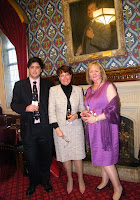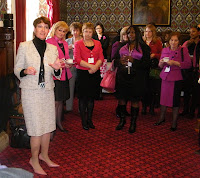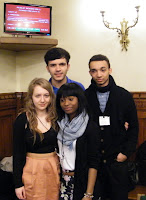Pink Shoe founder Helene Martin Gee, members and friends were hosted by Anne Marie Morris MP at the House of Commons for a Champagne Afternoon Tea to mark the centenary of International Women’s Day. Pink Shoe put together a Roll of Honour of ‘100 Remarkable Women’ to celebrate the 100 years.
At the tea, Anne Marie greeted guests warmly and praised the many inspiring women being celebrated. Anne Marie also reminded us how important it is to work with young people, so that future leaders are supported and inspired.
Anne Marie then proposed a toast to the women of the Pink Shoe Roll of Honour, and also to Janet Lakhani, who was celebrating a very special Birthday, along with son Adam (left), and to whom we all sang ‘Happy Birthday!’
Guests spent time viewing the Roll of Honour presentation, mingled over pink fizz and enjoyed a superb afternoon tea complete with pink fairy cakes!
At the tea, Anne Marie greeted guests warmly and praised the many inspiring women being celebrated. Anne Marie also reminded us how important it is to work with young people, so that future leaders are supported and inspired.

Helene thanked the MP, saying as a successful businesswoman as well as a Parliamentarian, it was especially fitting for Anne Marie to host a celebration of successful women.
Helene then announced the Pink Shoe Roll of Honour and went on to say: "These 100 Remarkable Women are truly exceptional self-made women who have each added something to the world. Innovators, leaders and campaigners. Some showing immense bravery and courage fighting for freedom and equality. Not afraid of controversy or even breaking the law, these women have left an indelible mark on the world, changing it forever.
Helene then announced the Pink Shoe Roll of Honour and went on to say: "These 100 Remarkable Women are truly exceptional self-made women who have each added something to the world. Innovators, leaders and campaigners. Some showing immense bravery and courage fighting for freedom and equality. Not afraid of controversy or even breaking the law, these women have left an indelible mark on the world, changing it forever.
- 25 of these remarkable women have had postage stamps made in their honour
- they’ve led countries and armies
- killed with their bare hands
- been imprisoned for obscenity and criminal damage
- sunk a battleship, smuggled birth control, fought prejudice
- changed the way we dress…
- changed public perceptions of vital issues such as mental health
- become beacons for peace, changed laws and changed the way we are governed
- become political prisoners or placed under house arrest
- have waged war, been exiled, executed, assassinated, or murdered
- been at the forefront of computing, physics, scientific breakthrough and medical science
- become the most prolific and successful authors ever
- led the way in the arts, media, TV and film
- broken world records; raised huge sums for charity
- changed the way we look at the environment, worked to protect endangered species
- been teachers, advisers and mentors
- many have built significant fortunes, some have changed the way business is done
They have truly changed the world.
As well as all these public achievements they were also wives, lovers, mothers, sisters, daughters, aunts and friends. And alongside them, are all our unsung personal heroes - the teacher, mother, mentor, we each have if we’re lucky.
 For all these women and for all of you, lets celebrate the past 100 years and commend these women in our Roll of Honour. And lets also look to the future, the hand across history that we can each offer to young people and to those around us. So the next century is filled with even more remarkable women changing the world".
For all these women and for all of you, lets celebrate the past 100 years and commend these women in our Roll of Honour. And lets also look to the future, the hand across history that we can each offer to young people and to those around us. So the next century is filled with even more remarkable women changing the world".
 For all these women and for all of you, lets celebrate the past 100 years and commend these women in our Roll of Honour. And lets also look to the future, the hand across history that we can each offer to young people and to those around us. So the next century is filled with even more remarkable women changing the world".
For all these women and for all of you, lets celebrate the past 100 years and commend these women in our Roll of Honour. And lets also look to the future, the hand across history that we can each offer to young people and to those around us. So the next century is filled with even more remarkable women changing the world".
Anne Marie then proposed a toast to the women of the Pink Shoe Roll of Honour, and also to Janet Lakhani, who was celebrating a very special Birthday, along with son Adam (left), and to whom we all sang ‘Happy Birthday!’
Guests spent time viewing the Roll of Honour presentation, mingled over pink fizz and enjoyed a superb afternoon tea complete with pink fairy cakes!












